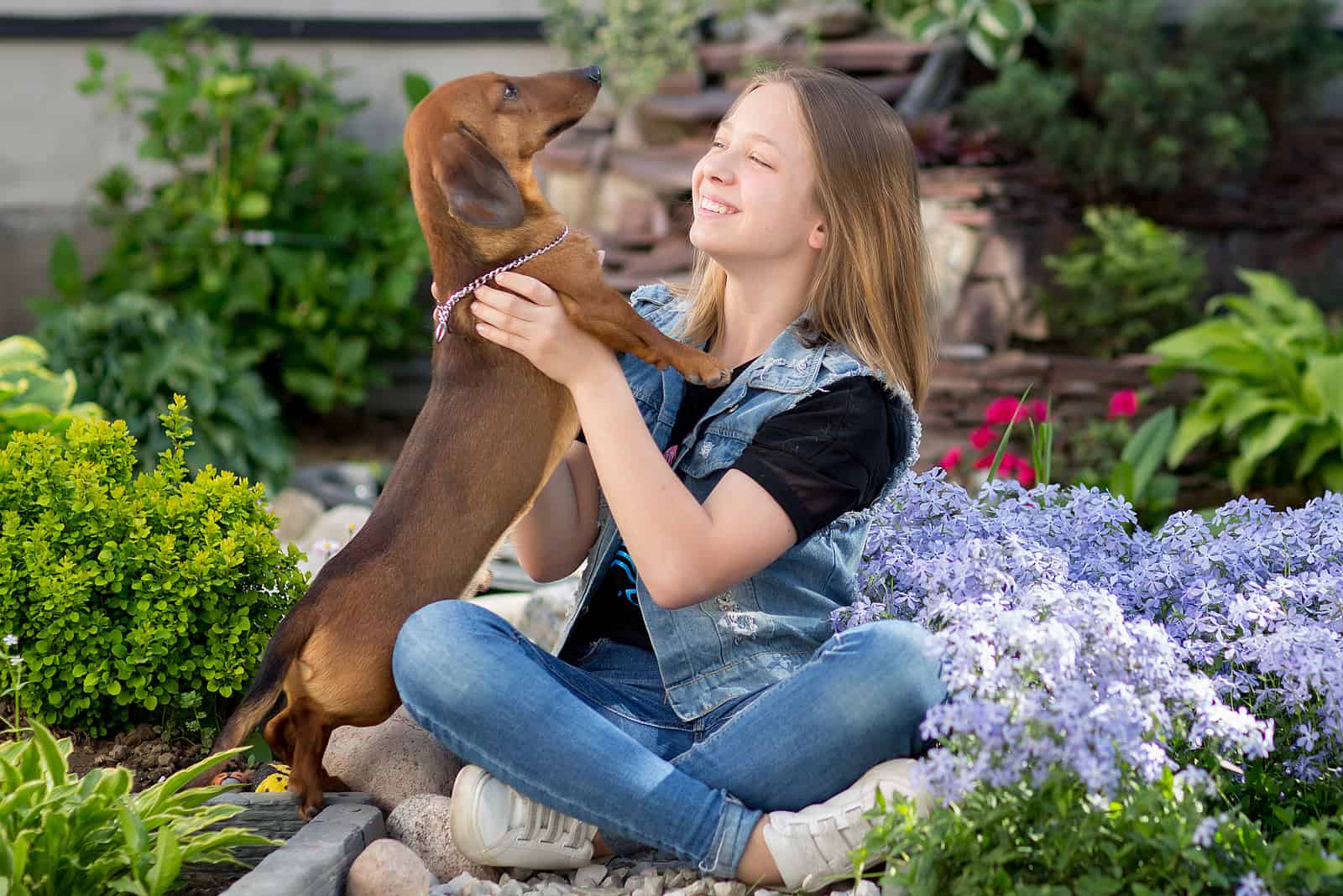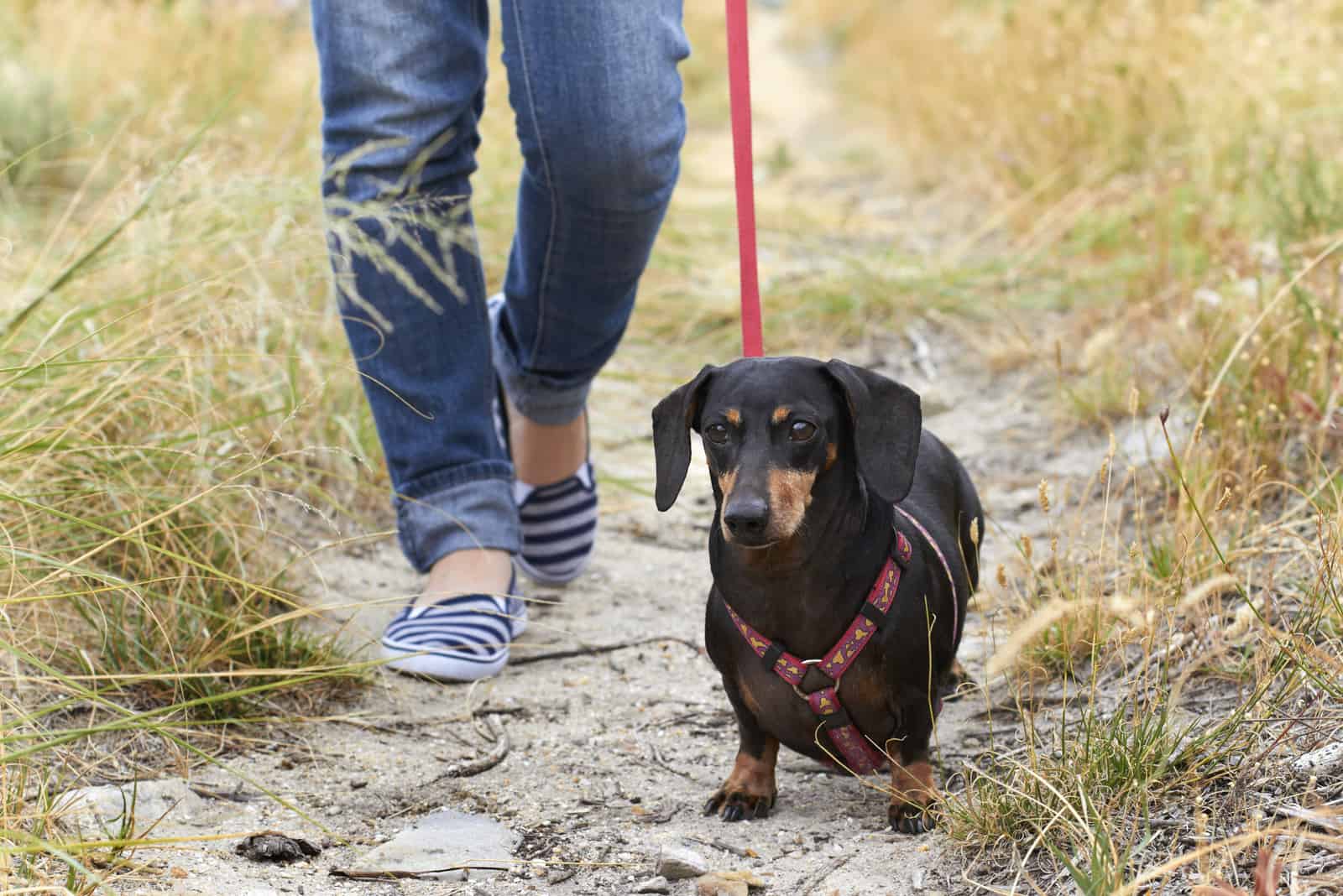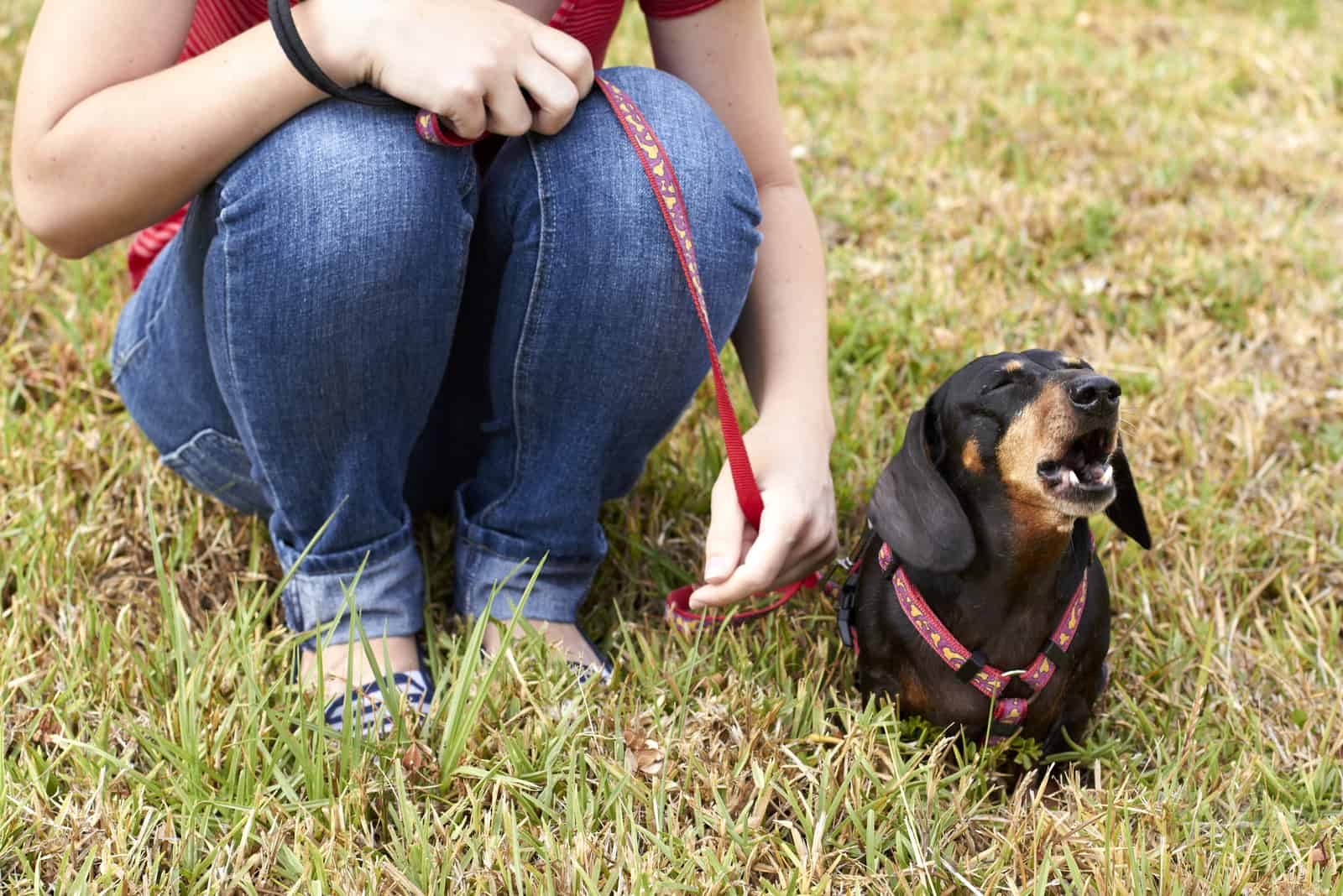Whether you know it as the Sausage Dog, Doxie, or Wiener-Dog*, the Dachshund is the cutest little dog, full of personality and vitality.
They have plenty of character and courage. They’re playful, independent, and loyal.
They’re also known to be very clingy, often to the point of making life for Dachshund owners a real challenge! So what’s that all about? Why are Dachshunds so needy?
Maybe you’re a Dachshund owner, or perhaps you’re looking into getting a Doxie dog of your own, and you want to understand this trait.
Whatever your reasons for researching this topic, you’ll find the answers right here!
*Not Weiner, which is a common misspelling!
Why Are Dachshunds So Needy?

It all started back in 15th-century Germany when certain people wanted a special type of dog to help them hunt badgers (Dachs is German for badger).
To achieve this, they mixed several different German and European hunting dogs and created the Dachshund breed.
As we already mentioned, their hunting hound heritage meant they had a strong pack animal instinct. This means they view all family members as part of the pack, with you as the pack leader. You’re also the one who provides food and looks after them when they’re sick.
This makes them great family dogs, although they can try your patience at times due to their needy and clingy nature.
Let’s break this down to understand this little dog better and help anyone who asks, why is my Dachshund so clingy?
Why Are Dachshunds So Clingy?

Basically, it’s because they are pack animals that have been bred to be super-loyal.
Hundreds of years of breeding have sharpened their natural instincts to produce a loving, devoted dog that can’t cope with being apart from you.
Most dog breeds are like this to some extent, but the Dachshund has earned a reputation for being extra sensitive when it comes to being needy!
Even so, there are other factors that contribute to this trait and several ways to reduce clinginess. We’ll deal with the reasons behind this behavior first before looking at some advice on how to curb it.
As well as being needy, Doxies are famous for being stubborn, so they’re not the right choice for everyone. This is something to be aware of if you’re considering getting one as a pet. Potty training and obedience training can be a challenge, and if you think they’re setting foot outside when it’s raining, forget it!
This combination of neediness, stubbornness and independence is too much for some people, so only go ahead if you are absolutely sure.
Separation Anxiety
This is a big problem for many dog breeds, and it’s a major issue for the Dachshund!
You are the center of your dog’s world, and they love being with you all the time. Doxie dogs are small enough to cuddle on your lap, and that’s where they are happiest.
So, when you leave them at home and head out without them, they feel confused, lonely, and abandoned.
This can lead to your Dachshund shaking and whining.
Separation anxiety is similar to a panic attack. Your dog isn’t wrecking your home out of spite while you’re gone; it’s reacting out of anxiety and frustration as it doesn’t understand why you aren’t there.
It isn’t howling, barking, and crying nonstop just to annoy the neighbors; it’s just really, really missing you! And don’t let their small size fool you – Dachshund’s barking is hard not to be noticed!
Dogs process the passage of time differently than humans; they can’t tell whether it’s been twenty minutes or two hours since they saw you last.
How To Reduce Separation Anxiety
Although some experts suggest that some dog breeds can be left alone for eight hours, most agree that four hours is the limit. For the Doxie, that’s the absolute maximum you should ever leave them alone for.
It’s not only about missing you; your pooch might need a bathroom break while you’re out! That alone will make them anxious, as they know the rules by now and won’t want to pee or poop in the house.
So, always make sure they go potty before you leave, and never let them be alone for any more than four hours at a time.
If that’s not practical, get someone to drop by to say hi to your furry companion and perhaps stay awhile. Alternatively, leave them at doggy daycare for an hour or two.
You could also consider getting two Sausage Dogs instead of one, as they can keep each other company.
Normalize Your Absence
The best way to beat separation anxiety is to get your puppy used to spending time away from you, and it’s essential to start this process at an early age.
They must learn that your absence is a normal part of daily life. So, when they are young, set some time aside to place them in their crate or another room, and leave them there for a set amount of time.
Start by leaving them for a few minutes, and gradually increase this until you reach an hour or so.
Also, dogs pick up on specific signs that you’re about to leave home, such as putting on shoes and coats or picking up keys. Try doing one or two of these actions and then staying home, and your pooch will stop connecting them with being left home alone.
Finally, don’t draw attention to your departure! Many dog owners make a fuss when leaving, smothering their beloved pals with hugs and kisses, but this only heightens the fact that they’re going.
Likewise, when you return, wait for ten minutes before greeting your dog. It’s not easy to do, but it’s worth it in the end, as they’ll eventually come to accept your absence as normal.
Fear, Stress, And Anxiety

Aside from separation anxiety, dogs can be affected by other factors that make them clingy.
Here’s a selection of possible triggers:
• Loud noises. Thunder, fireworks, power tools, vacuum cleaners, etc., can set your dog’s nerves on edge, and they’ll be scurrying to you for protection!
• Going to a new home. Whether they’ve come from a breeder or a shelter, your dog will be anxious about its new home and the people in it. Most Dachshunds take between four to six weeks to form a solid bond with one person, usually someone who has provided the most attention, care, love, and food.
• Death in the family. The sudden departure of a loved one will affect your dog almost as much as it affects you. Dogs are sensitive to changes in atmosphere, and they’ll know that someone is missing, too. This would be particularly acute if the deceased were their favorite person!
• Changes in routine. Dachshunds are sticklers for routine, and they hate any disruption to their schedule. This includes a change in meal times, the time of their daily walk, moving their bed to a new spot, or a different time for their bathroom breaks. This stress can also be noticed by your Dachshund experiencing shedding in a greater amount than usual.
• A tense atmosphere at home. Arguments and upsets can affect dogs, too. Doxies are especially sensitive to harsh tones and shouting. They can even become clingy when they sense that you’re stressing over everyday things, like money, appointments, etc.
• A new arrival (such as a baby or a new pet). A wailing newborn baby makes a lot of noise and takes attention away from the dog. This is likely to make your pooch needier than ever.
• A family member leaving home. This could be an older kid heading to college or the result of a family breakup. Either way, pets are often left confused and anxious.
• Sickness in the home (especially serious or terminal illness). As we already said, dogs don’t much like change! They prefer a settled atmosphere and a steady routine. They know when something is wrong (and often sense sickness well before we do) and may become very clingy.
These are a few examples of factors that can affect dogs, making them follow you and seek attention more than ever. Keep these in mind when you ask, why are Dachshunds so needy?
What can you do about it? If you notice any signs of anxiety in your dog, consider all the above points to see if there’s something obvious that may have triggered it.
Of course, you have absolutely no control over some of these issues and little control over others.
As far as possible, try to reduce the amount of stress your dog faces. If necessary, ask your vet for calming medication to ease your pup through traumatic periods. CBD oil is proving particularly helpful to pet parents in calming their anxious pooches.
Boredom
Doxies are active, playful dogs that need at least an hour of daily exercise. On top of this, your pet will want to play, so be prepared for lots of fun and games!
As well as physical exercise, a Dachshund needs mental stimulation, just like any other intelligent, active dog.
Without this, they can become bored and frustrated, which is expressed outwardly as aggressive or destructive behavior, and sometimes as clinginess. A bored dog might bug the heck out of you all day just because they need a good long walk!
Make sure you give your pooch plenty of mental stimulation and adequate physical activity. It’s been said many times before, but it still holds true that a tired dog is a happy one.
Fear Of Strangers!
Dachshunds are naturally protective and suspicious of strangers. It’s not that they’re typically aggressive as such, just that they want to keep you safe.
Whether it’s a stranger visiting your home, or someone you meet while out on a walk, there’s a good chance that your dog will bark at them angrily and stick to your heels. They feel conflicted here: they want to protect you, but they also want you to protect them!
Consistent socialization is the key to resolving this behavior. A pup that’s been exposed to various experiences, places, people, animals, smells, sounds, etc., is less likely to react badly as an adult.
They are well adjusted and able to take things in their stride, as they learn to accept that not everything is a threat to them or their families.
Health Issues

Before dismissing your little furry friend’s neediness as a natural part of its character, it’s essential to be absolutely sure that there isn’t a medical reason behind it.
Dogs can’t tell us when they feel rough or in pain. You may notice a change in their behavior, like increased clinginess.
The following examples give an idea of what to watch out for:
• Cognitive decline can affect dogs in the same way dementia and Alzheimer’s disease affect humans. Older adult dogs with this condition become confused by their surroundings as it seems strange and unfamiliar.
• Hearing loss is stressful as it becomes harder to communicate with your pet. Sounds become jumbled and muffled, making it difficult for the dog to understand what’s happening around them. They will turn to you for comfort and support.
• Loss of sight is arguably worse than becoming deaf, although most dogs cope well with this condition. However, your pooch will increasingly rely on you for help as the condition worsens. Dachshunds are prone to PRA, a group of eye problems that eventually result in blindness.
• Spine problems are common in long dogs with short legs, including the Dachshund. Essentially, the vertebrae become weak and push up into the spinal canal, causing pain and lameness. It’s vital that the dog is treated as soon as possible, or they may lose the use of their back legs and become incontinent.
• Obesity is a major contributing factor in dog deaths as it puts stress and strain on the heart and the joints. It increases the risk of severe heart disease, organ failure, and certain cancers. An overweight dog will feel rough, especially if it has any other complications, and will seek comfort from you.
• Hip dysplasia affects most breeds, and the pain can be unbearable as the bones in the hip joint rub together. Your furry pal will probably come to you for help, as you’re the one who sorts out all the problems!
This is by no means a complete list of Dachshund health problems, but it gives you a clue as to what to watch out for when asking the question, why are Dachshunds so needy?
Pregnancy And Whelping
There are some differences beween male and female Dachshunds that can also lead to clingy and needy behavior.
It goes without saying that pregnancy can be a trying and stressful time! A female Dachshund carries her pups for between 58 and 68 days. During this time, she will undergo several changes as hormones flood her tiny body, and this will affect her behavior.
Some Doxies become defensive and aggressive; others will cling to you even more than usual. Mostly, it will be a mixture of all of these.
And once the pups are born, she may become even needier!
Most breeders encourage pet parents to have their dogs spayed or neutered as part of being a responsible dog owner. Unless you plan to breed your dog (and have the necessary knowledge and experience to do so), it’s always best to have your pooch ‘fixed.’
However, if you are set on producing Doxie puppies, always include your vet every step of the way. They can offer advice and be on hand in case of any complications or medical emergencies.
Even when they’re not pregnant, female Dachshunds can become moody and clingy when in heat.
Neediness Is Learned Behavior
Sometimes it’s difficult to determine certain behaviors from neediness, as they overlap. For example, many Doxies follow their owners everywhere – and we mean everywhere!
This could be because they want to be near you, but it could also be because they anticipate a reward or an activity of some kind.
Are you heading to the kitchen? Great! It’s time for a treat. Going into the backyard? Must be playtime! Opening the garage door? Good, let’s go for a drive in the car. Putting on your coat at the front door? Yay! We’re going for a walk!
Also, consider your own actions. What do you do when your Dachshund puppy follows you? Without a doubt, most people will reward the dog in some way by petting them or giving them a treat or a cuddle.
The dog then connects these two actions, and so the behavior is reinforced.
This is where tough love might be needed, as hard as it might be for some people. As with separation anxiety, you need to teach your puppy to spend time away from you. When you leave the room, make them stay where they are.
Always be sure to reward them if, and only if, they comply. They’ll soon learn that staying put will earn them a treat!
Resource Guarding
Although it’s not regarded as clinginess, resource guarding can be a sign of a needy dog.
This is when a dog acts possessively over its toys, food, treats, bed, etc. It can appear to be pretty aggressive at times! Because of this, the Doxie has earned a place in dog bite statistics as the pooch most likely to bite.
Thankfully, they are small dogs, so they won’t do as much damage as, say, a Rottweiller. Even so, it can be a painful experience, and the victim may need a tetanus shot.
Resource guarding often occurs when there’s competition for attention and affection. Basically, your dog is acting up because it’s jealous!
What’s the answer? First, find a good breeder! All the best breeders start socializing their pups early. When puppies learn to share at an early age, they are less likely to resort to bad behavior as an adult.
You need to continue socializing your pup from day one. Ideally, you should reach a stage where you can place your hand in your pet’s food bowl without them growling or snapping at your fingers.
What About Miniature Dachshunds?

How does the Mini Dachshund figure when it comes to the question, why are Dachshunds so needy?
If anything, they’re worse than their bigger counterparts! It seems that their smaller size makes them needier and more clingy, possibly as they feel vulnerable.
This means extra work for you if you want to overcome the problem.
Again, it’s best to train your pup to spend time apart from you. You could even try ignoring them for a few minutes when they come seeking attention, although few pet parents will be able to last for long without giving in and having a cuddle!
In the end, it depends on how happy you are with constantly being followed everywhere and having a dog on your lap, in your face, under your feet, in your bathroom, or even in your bed.
It’s best to address this problem well before it starts, and sometimes you might need a helping hand in the form of a professional dog trainer.
Why Are Dachshunds So Needy? Final Thoughts
Why are Dachshunds so needy? The truth is that they’re just built this way! If you get a Doxie dog, be prepared for clinginess.
However, we’ve learned that there are certain circumstances that contribute to making them worse. We also know that there are ways to reduce this trait.
One piece of good news is that older dogs like to nap and spend more time sleeping, so you’ll get a break then.
However, if you start off on the right foot, you can stop your Dachshund being so needy.
Find a good breeder who socializes their pups and starts basic training. Continue that process when you get the puppy home, and make sure you teach them to accept your absence as part of the regular routine of the day.
Don’t fuss before heading out the door or when you return home. Try to keep the atmosphere at home as calm as possible, and don’t reward your furry friend for needy behavior!
It has to be said that, even doing all this, you’ll probably still have a dog that wants to be with you always. But if you ask Dachshund owners about this, they’ll all say they wouldn’t have it any other way.
Read Next:
• 6 Dachshund Terrier Mixes For Every Owner
• Dachshund Feeding Chart: A Look Into A Wiener Dog’s Diet


